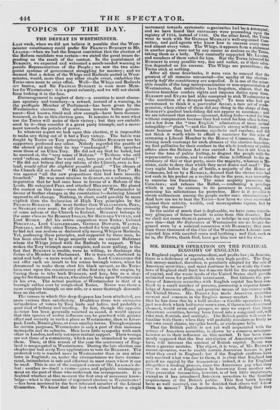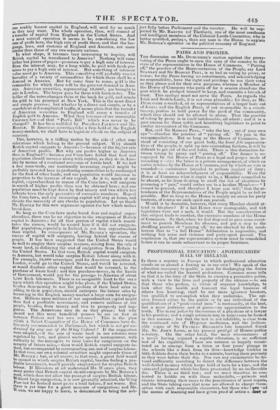MR. BIDDLE'S OPERATION ON THE POLITICAL ECONOMY OF ENGLAND.
IN England capital is superabundant, and profits low; in America, there is a deficiency of capital, with very high profits. The Ent,,- list' money-market, therefore, is peculiarly adapted flit' the sale of American securities; and must continue to be so while the Corn- laws of England shall limit her domestic field for the employment of capital, and the waste lands of the United States shall provide unlimited room for profitable investment. But hitherto time pur- chase of American securities with English capital has been con- fined to a small number of persons, possessing a superior know- ledge of American affairs, and peculiar means of intercourse with the United States. Mr. BIDDLE has made American securities current and common in the English money-market. It is true that he has done this by a bold stroke—a forcible operation ; but, Just as a duck which had never seen w ater, if thrown into its natural element, would swim and prosper, so may we expect that these American securities, having been forced into a congenial soil, will take root, flourish, and multiply. The British public will soon be familiar with them; when they will probably circulate as freely as our own canal shares, turnpike bonds, or exchequer bills. That the British public is not yet well acquainted with the nature of American securities, is shown by a common misappre- hension as to their influence on this market. It has been com- monly supposed that the free circulation of American securities here, will increase the amount of British capital. Never was there a greater mistake. The object, it is true, of Mr. BIDDLE S recent operation, was to enable certain American houses to pay what they owed in England ; but if the English creditors have only received what was due to them, it is clear that England has gained no capital by the transaction : indeed, it is for England altogether a lending process, since the Americans pay what they owe to one set of' Englishmen by borrowing from another set. This particular transaction, however, is of but little importance, except as it has introduced American securities to the familiar acquaintance of the British public. This first batch having been so well received, can it be doubted that others will follow them in masses? The Americans, in short, finding that they ean readily borrow capital in England, will send for as much as they may want. The whole operation, then, will consist of
a transfer of capital from England to the United States. And a most natural operation it seems to be, considering the low rate of profit here, the high rate of profit there, and that the lan- guage, laws, and customs of England and America, are more similar than those of any two separate nations. In what shape, it becomes very interesting to inquire, will British capital be transferred to America? Nothing will come hither but pieces of paper—promises to pay a high rate of interest. Even the interest may, for a long while, be paid with fresh pro- mises to pay a high rate of interest. But something of intrinsic value must go to America. This something will probably consist hereafter of a variety of commodities for which there shall be a demand in America. But for some time to come, gold is the commodity for which there will be the greatest demand in Ame- rica. American securities, representing 10,000/., are brought to sale in London. The buyer pays for them with bank-notes. The holder of the notes changes theist at the bank for gold, and remits the gold to his principal at New York. This is the most direct and simple process; but whether by a direct and simple, or by a roundabout ard complicated traffic, it seems plain that the transfer of American securities to England will cause a transfer of Euglish gold to America. What then becomes of our immutable Currency-law—of that " Peel's Bill" which was never to be
changed? It has been nullified by President JACKSON and Mr. BIDDLE. If American securities take a firm hold of the English money-market, we shall have to legislste afresh on the subject of currency.
This, however, is a trifling matter by the side of other con- siderations which belong to the present subject. Why should British capital emigrate to America ?—because of the higher rate of American profits. But why are profits higher in America than in England ?—because our Corn-laws forbid that food and population should increase along with capital, as they do in Ame- rica by means of a continual accession of fertile land. If we had a free corn-trade, our continually increasing capital might be profitably invested here in producing commodities to be exchanged for the food of other lands, and our population would increase in proportion to the increase of our capital. As it is, much of our capital, superabundant by reason of the Corn-laws, will emigrate in search of higher profits than can be obtained here; and our population must be kept down by that misery and vice which has hitherto been the only preventive of excessive numbers. Repeal the Corn-laws, and our increasing capital will stay at home, and obviate the necessity of any checks to population. Let us thank Mr. Biopsy. for this new argument against the law o hick makes bread dear.
So long as the Corn-laws make bread dear and capital super- abundant, there can be no objection to the emigration of British capital to America ; for all that portion of capital which consti- tutes the excess, would be wasted here if it did not emigrate. But population, especial:3. in Ireland, is not less superabundant than capital. In consequence of Mr. BIDDLE's operation, the excess of capital will emigrate, leaving behind the excess of people. It has been suggested that the United States would do well to employ their surplus revenue, arising from the sale of waste land, in defraying the cost of emigration from Britain to
the United States. In that case, British capital would emigrate to America, but would take surplus British labour along with it. For example, 10,000 sovereigns paid for American securities in London, would go to the United States, and would be invested, or would displace other capital that would be invested, in the purchase of waste land : and this purchase-money, in the hands of Government, would pay for the passage to America of about 1,500 Irish labourers. There is no assignable limit to the sca'e upon which this operation might take place, if the United States, besides determining to use the produce of their land sales in adding to fink population, should anticipate the future sales by borrowing in the English money-market a large sum for emigra- tion. Millions upon millions of our superabundant capital might thus find a profitable investment, and remove millions of our people, besides, from misery and vice to prosperity and hap- piness. The Americans may do as they please; but why should not this most beneficial process be set on foot as between Britain and her own colonies ? This is the plan which a Select Committee of the House of Commons have de- libemtely recommended to Parliament, but which is not yet un- derstood by any one of the Whig Cabinet ! lithe suggestion
were adopted,—if the sale of waste land in our colonies were regulated by law, and placed under special management, with authority in the managers to raise loans for emigration on the security of future sales,—then would British capital emigrate in- deed, but accompanied by corresponding amount of surplus labour. In that case, our own colonial securities might supersede those of
Mr. BIDDLE ; but, at all events, ill that case, a great field would be opened in which surplus British capital, besides finding a pro-
fitable investment, iwould provide employment for surplus British
labour. If Ministers at ail understand Mr. Waev's plan, they must prefer that British capital should emigrate by Mr. BIDDLE s
road, which does not allow the passage of surplus British labour. Without large emigration, it is now generally admitted, the W big Poor-law fur Ireland must prove a total failure, if' not worse. But
there is yet time for a great measbre of emigration; and Mr. WARD, we are happy to learn, is determined to bring the sub- ject fully before Parliament and the country. He will be sup- ported by Mr. BARING (of Thetford), one of the most assiduous and intelligent members of the Colonial Lands Committee, who is better qualified, perhar s, than any man in the House to exp!ain Mr. Bunnies operatior on the political economy of England.



























 Previous page
Previous page